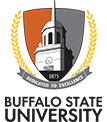CRITICAL THINKING AND REASONING
Students will:
- clearly articulate an issue or problem;
- identify, analyze, and evaluate ideas, data, and arguments as they occur in their own or others’ work;
- acknowledge limitations such as perspective and bias; and
- develop well-reasoned (logical) arguments to form judgments and/or draw conclusions.
SUNY Guidance
Students need to acquire critical thinking and reasoning skills appropriate to the demands of the 21st century citizen, and campuses must have flexibility to implement and assess these learning outcomes across a diverse range of academic programs.
The Critical Thinking and Reasoning competency is not necessarily associated with any one course, though the student learning outcomes may be required in one or more courses. In either case, campuses must ensure that the required learning outcomes are included in each undergraduate degree curriculum.
INFORMATION LITERACY
Students will:
- locate information effectively using tools appropriate to their need and discipline;
- evaluate information with an awareness of authority, validity, and bias; and
- demonstrate an understanding of the ethical dimensions of information use, creation, and dissemination.
SUNY Guidance
Students need to acquire information literacy appropriate to the demands of the 21st century citizen, and campuses must have flexibility to implement and assess these learning outcomes across a diverse range of academic programs.
The Information Literacy core competency is not necessarily associated with any one course, though the student learning outcomes may be required in one or more specific courses. In either case, campuses must ensure that the required learning outcomes are included in each undergraduate degree curriculum.

